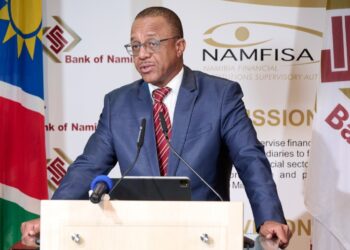
Namibia is unlikely to default on its debt obligations despite the country being ranked highly by Bloomberg among states that may fail to service their debts this year, Economists have said.
Defaults happen when governments are unable to meet some or all of their debt payments to creditors. It can damage a country’s reputation with investors, making it harder for it to borrow the money it needs on international markets, which can further harm confidence in its currency and economy.
“At present we do not regard Namibia to have a high probability of default as the country has the option to roll over its debt when it is due,†FNB Namibia Group Economist Ruusa Nandago told The Brief.
“Furthermore, most of the debt held by the government is domestic debt rather than foreign debt, which further cushions against the possibility of default. The government has indicated that they do not plan to issue more foreign debt.â€
She, however, noted that the high debt will limit the government’s ability to cushion the economy against external shocks, while an increased share of its revenue will be directed towards servicing the debt which is expected to reach N$140 billion at the end of this fiscal year.
“Namibia’s debt is a concern, not necessarily from a risk of default point of view, but rather because an increasing share of revenue will have to go towards servicing this debt. This leaves little room for the government to increase capital/development expenditure which are crucial for stimulating the economic recovery. It further gives the government less room to be able to cushion the economy against severe shocks,†she said.
The Economist said reducing Namibia’s debt levels requires a combination of revenue growth and prudent fiscal management.
“A strong, broad based and sustainable GDP growth which will increase domestic sources of revenue and reduce the dependency on debt for government’ expenditure objectives is crucial. Furthermore, prudent fiscal management should be focused on reducing expenditure leakages which lead to high deficits. The focus should also be on expenditure which is growth enhancing such as an increase in the development budget as opposed to the operational budget,†she said.
Simonis Storm Economist Theo Klein also concurred with Nandago’s assessment that the country’s risk of defaulting is very far off.
“We are definitely not there at the moment and do not see risks of default anytime soon. In the last 5 years public debt has more than doubled, whereas the economy has been contracting by 1.7% on average. With debt growing much faster than the economy, debt sustainability risks have increased steadily. However, we might be a long way off from defaulting. But, If we do not see a material improvement in economic growth and job creation, then debt sustainability and defaulting will become a bigger risk in the medium-term (10 to 15 years),†he told The Brief.
Klein indicated that implications of not correcting the current situation will lead to numerous negative outcomes in the medium- to long-term, as government finances remain constrained, and debt cannot filter through to the real economy.
“State owned enterprises and other government institutions could see further budget cuts, limiting their general operations and any initiatives they want to implement. Public wages will unlikely see inflation adjusted increases. Social spending will be hampered and lead to poor outcomes in public education and healthcare. Developmental spend with regards to upgrading infrastructure will also be limited. If the situation does not improve, Namibia could see further credit downgrades by Moody’s and Fitch,†he said.
He further indicated that Namibia was seeing fairly low returns on investment from debt spending.
“The debt levels are not a major concern per se, it is the use or spending of this debt that is concerning. If debt was wisely used to upgrade hospitals, schools, roads/railway, etc. combined with pro-poor economic growth that creates jobs, then debt does not have to be a concern. However, we are seeing fairly low returns on investment from debt spending in Namibia. The reason for this is that an alarmingly high share of new debt that is raised is being used to repay old debt. This means that a certain portion of debt is not filtering through to the economy to stimulate economic activity, but rather repaying old debt. This is more concerning compared to the actual debt levels,†Klein said.
He said job creation will be key towards assisting the government repaying its debt, through income tax collection.
“Government needs to enhance the income generating capacity of the economy, so that tax revenue can improve and assist the government in repaying its debt more sustainably. We need better job creation that can mainly come from structural reforms, the implementation of special economic zones and improving the ease of doing business. Personal income tax is the second largest component of total tax revenue, so creating jobs that pay salaries above the tax threshold would be the most resilient way of improving government debt sustainability,†Klein said.











